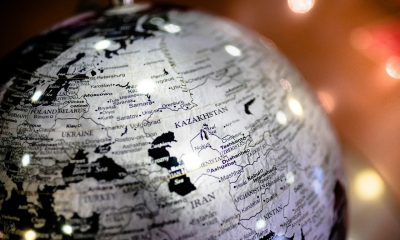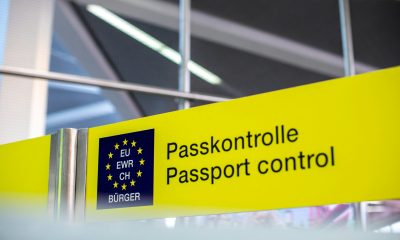Belçika
#Russya'da Yaptırımlar: Avrupa için Yeniden İnceleme Zamanı


After the European Union imposed sanctions on Russian individuals and businesses, relations between Brussels and Moscow have reached a historic low. Among the numerous entities targeted was Rosneft, an oil and gas company 50% owned by the state, where BP retains a 19.75% stake and the Swiss Glencore and Qatar Investment Authority hold another 19.5%. With the company now başlatılması a new legal challenge against a Mach 2017 ruling by the European Court of Justice (ECJ) the on-going dispute between the EU and Russia is entering a new round.
The ECJ iktidar in question upheld the sanctions slapped on Rosneft. In a statement, the company criticized the ruling as “illegal, baseless and politicized”, allegations that are also forming the basis for the new procedures filed on December 13th. And indeed, Rosneft pointed out that it had ceased all business it had in Crimea when the sanctions were imposed, and was not involved in the crisis in Ukraine in any capacity. It’s no wonder then that many voices in Europe have been quick to bemoan the politicized nature of the ECJ’s decision, whose decisions are harming the national interest of many EU countries. Jacques Sapir, a French economist, implied that much when he criticized the sanctions as “important to European leaders from an ideological standpoint, since they enable them to pose as neat and fair while they violate the founding principles of the European economic community, democracy, pluralism and solidarity”.
Rosneft’s legal challenge should force Brussels to confront and re-evaluate its current approach to Russia. Member States would be well-advised to do so, because the effectiveness of the restrictive measures has been anything but stellar. Far from achieving the originally formulated policy objectives, the sanctions have largely backfired and adversely affected European economies. A 2015 Austrian study estimated Europe’s trade losses from the sanctions to amount to roughly € 100 milyar, and put two million jobs across the EU at risk, as a result of the halving of exports to Russia since they came into force.
Unsurprisingly, it is Europe’s biggest economy that stands to lose out the most. Germany has taken the full brunt of reduced trade with Russia, resulting from its strong degree of interdependence with the Russian economy. As a consequence, that same Austrian study estimated that up to 465,000 Germans could lose their jobs. In 2015, German exports to Russia düştü by 26% compared to 2014. Even if trade between the two countries geri sekti slightly in 2017, Berlin is under immense pressure from German companies to facilitate exports to Russia by all means.
As a consequence, the common front in favour of punitive measures against Russia is crumbling. When the United States proposed to expand its Russia sanctions in July, high-ranking German officials were quick to throw their weight behind a German industry association’s uyarı that further US measures would hurt German companies. Economy minister Brigitte Zypries subsequently belirtilen that the US’ proposals were “against international law”, arguing that Washington was in pozisyon yok to punish German companies for business interests in Russia.
With the German industry breathing down his neck, Germany’s foreign minister Sigmar Gabriel urged the EU to fight back against the US sanctions, having previously warned that Berlin değil mi tolerate any sanctions against German firms involved in energy projects in Russia. Gabriel has since become a leading voice in German politics arguing in favour of relaxing European sanctions against Moscow. In September 2017, he önerilen for the EU to consider a "gradual relaxation of the sanctions” in order to improve relations with the country.
And it is not only the foreign minister who has reached this conclusion. German economists, such as Sabine Fischer from the prestigious German Institute for International and Security Affairs, to politicians like Markus Frohnmeier, have increasingly opined that the sanctions imposed on Russia are ineffective and not in Germany’s interest.
This argument is also frequently placed within the context of sluggish recovery in much of the Eurozone since the financial crisis in 2008. Reduced trade with Russia has also katkıda to Europe’s rather lacklustre recovery, since, as history shows, an economically weaker Germany creates severe knock-on effects for other European states. For example, in 2014, after Brussels imposed its sanctions, economic confidence indices for Germany daldı to a record low, sparking fears that Europe’s path to recovery would be prolonged indefinitely.
Gabriel’s thinking may be informed by an increasing realization that the sanctions have done little to affect change in Russia’s behaviour. Russian President Vladimir Putin’s recent duyuru to run for office once again in March next year provides little reason to believe that the Kremlin’s foreign policy will change anytime soon. Owing to his continually high popularity with the Russian electorate, Putin has little reason to backtrack – a key objective of Europe’s sanctions. His unassailable position has helped him defy Western pressure, and the Russian President has made clear that he has been unimpressed by American and European efforts to nudge Moscow’s foreign policy.
Which begs the question why Brussels continues to insist on the continuation of restrictive measures against Russia. Neither Germany, nor other European countries, has gained any advantages as a result. Jeopardizing the EU’s economic prosperity in order to score ideological points is hardly in accordance with the principle of common solidarity so often touted by Eurocrats. The bottom line is that retaining a sanctions regime that does not deliver on its objectives is ludicrous and Brussels would be wise to take a step back and reconsider its options.
Bu makaleyi paylaş:
-

 Çatışmalar4 gün önce
Çatışmalar4 gün önceKazakistan devreye giriyor: Ermenistan-Azerbaycan arasındaki uçurumun kapatılması
-

 Genişleme5 gün önce
Genişleme5 gün önceAB, 20 yıl önce 10 ülkenin katıldığı iyimserliği hatırlıyor
-

 Arac4 gün önce
Arac4 gün önceFiat 500 ve Mini Cooper: Ayrıntılı Bir Karşılaştırma
-

 Covid-194 gün önce
Covid-194 gün önceBiyolojik Ajanlara Karşı Gelişmiş Koruma: ARES BBM'nin İtalya'daki Başarısı - Bio Bariyer Maske



























